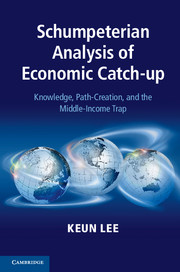Book contents
- Frontmatter
- Contents
- List of Figures
- List of Tables
- Foreword
- Preface
- Part I Introduction and perspectives
- Part II Empirical analysis at three levels
- Part III Toward a theory and how to escape the trap
- Part IV Technological turning points and conclusion
- 9 Hypothesizing a theory of technological turning points
- 10 Summary and concluding remarks
- Appendix tables
- Notes
- Bibliography
- Index
10 - Summary and concluding remarks
from Part IV - Technological turning points and conclusion
Published online by Cambridge University Press: 05 June 2014
- Frontmatter
- Contents
- List of Figures
- List of Tables
- Foreword
- Preface
- Part I Introduction and perspectives
- Part II Empirical analysis at three levels
- Part III Toward a theory and how to escape the trap
- Part IV Technological turning points and conclusion
- 9 Hypothesizing a theory of technological turning points
- 10 Summary and concluding remarks
- Appendix tables
- Notes
- Bibliography
- Index
Summary
Summary
A number of studies have focussed on the poverty trap, which is a highly relevant topic for low-income countries. By contrast, relatively few studies have investigated the sustaining of growth beyond the middle-income level. Although several studies have proposed that developing countries can take off by targeting industries in which they have comparative advantage, few have discussed the issue of sustaining growth after the initial short-lived spurt of development. Therefore, the questions that motivate this study are as follows. Which factors lead to growth that can be sustained for an extended period? Which factors bring about a short-lived process of catch-up, particularly for middle-income developing countries?
The current study proposes that technological capability is a key factor for sustainable progress. A detailed analysis of the innovation system at three levels (i.e. firm, sector, and country) is conducted using a neo-Schumpeterian perspective. Within each of these three levels, we examine different aspects of innovation systems, including the cycle times of technologies, the localization of knowledge creation and diffusion, the concentration of knowledge creation among innovators, and the originality of technologies.
- Type
- Chapter
- Information
- Schumpeterian Analysis of Economic Catch-upKnowledge, Path-Creation, and the Middle-Income Trap, pp. 223 - 228Publisher: Cambridge University PressPrint publication year: 2013



